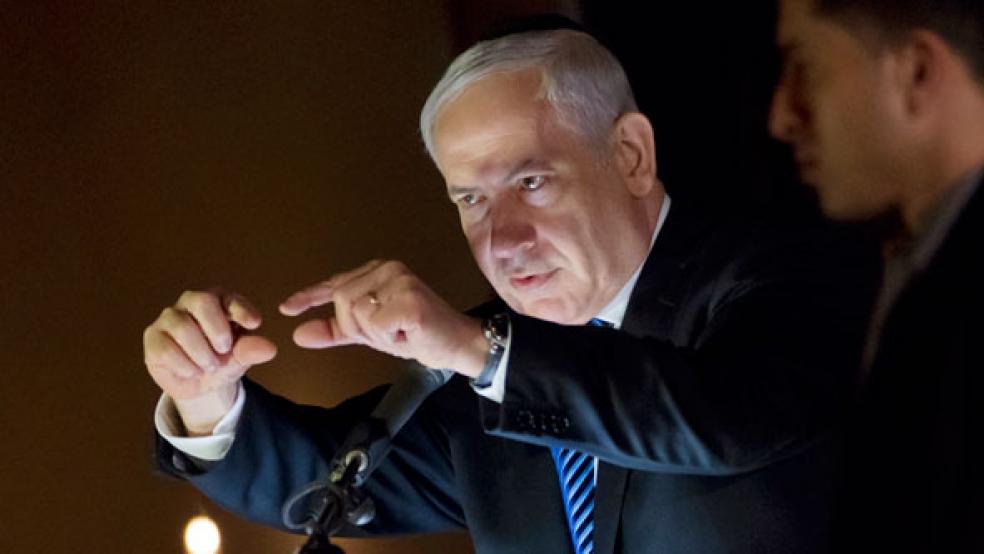Just days after the Obama administration announced a tentative framework for a nuclear deal with Iran, Israeli Prime Minister Benjamin Netanyahu is pressing world leaders to reject the deal and start over.
During an interview with CNN’s “State of the Union,” Netanyahu called the tentative agreement with Iran, which relaxes sanctions in exchange for slowing down the country’s ability to develop nuclear weapons, “a very bad deal” that would present an imminent threat to his country.
Related: Americans Support Nuclear Deal with Iran, but Don’t Think it Would Work
On Thursday, President Obama and Secretary of State John Kerry announced the tentative framework for a deal with Iran that requires the country to give up about two thirds of its centrifuges –or equipment used to enrich uranium. It will also be required to reduce its stockpile of enriched uranium from 10,000 kilograms to 300 kilograms.
In exchange, the U.S. and European nations would be required to lift sanctions on Iran that have crippled the country’s economy. President Obama toted the agreement as “historic framework” that meets the country’s “core objectives.
“I am convinced that if this framework leads to a final comprehensive deal, it will make our country, our allies and our world safer,” Obama said during a speech at the White House on Thursday. Netanyahu, who has a strained relationship with the White House, instantly attacked the agreement.
“The billions of dollars Iran will have flowing through its coffers will not be for schools, hospitals or roads, “but to pump its world wide terror machine and military machine that is busy conquering the Middle East as we speak.” He said during a separate interview Sunday on NBC’s Meet the Press.
Related: How Iran Is Taking Over the Middle East
“It leaves the preeminent terrorist state of our time with a vast nuclear infrastructure, not one centrifuge destroyed, thousands of centrifuges would be left spinning uranium, and not a single facility – including an underground nuclear facility – is being shut down,” he said.
Congressional Republicans also criticized the deal; they’re rallying around legislation that would require President Obama to seek congressional approval of any nuclear negotiations with Iran.
Sen. Bob Corker (R-TN), the chair of the Senate Committee on Foreign Relations said Sunday that his committee plans to vote April 14 on a measure that would require House and Senate approval of the deal with Iran.
“I think the American people want the United States Senate to go through this deal. They understand this is one of the most important geopolitical agreements that will take place during this decade,” Corker said on Fox News Sunday. “This is an appropriate place for us to be. If the president feels like this is something that’s good for the nation, surely he can sell this to the United States Senate and the House.”
Related: Here’s Why Obama Panders to Iran, Throws Israel Under the Bus
The majority of Americans say they support the working framework, according to a Washington Post-ABC News poll , However, some 59 percent said they don’t trust Iran will live up to the agreement.
The Obama administration has warned that Iran will face “tremendous consequences” if Iran disrespects the agreement and pursues building nuclear weapons.
“If they decide to go down that route,” CIA Director John Brennan said on Fox News Sunday earlier this month. “They know they will do so at their peril.”
President Obama is selling the deal to Congress and the public as the best option, with the alternative being another war in the Middle East.
"When you hear the inevitable critics of the deal sound off, ask them a simple question: Do you really think that this verifiable deal, if fully implemented, backed by the world's major powers, is a worse option than the risk of another war in the Middle East?" Obama said in a speech on Thursday. "Is it worse than doing what we've done for almost two decades with Iran moving forward with its nuclear program and without robust inspections?"
Related: A Naïve Deal with Iran Tops Obama’s Bungled Mideast Policy
Meanwhile, Netanyahu said another option exists that that doesn’t involve going to war with Iran.
“I think the alternatives are not either this bad deal or war. I think there’s a third alternative. And that is standing firm, ratcheting up the pressure until you get a better deal,” he said. “A better deal would roll back Iran’s infrastructure and require Iran to stop its aggression,” Netanyahu said Sunday. “It’s achievable.”
Tensions between the Obama administration and the Israeli prime minister hit a fever pitch after Netanyahu’s visit to Congress last month to urge lawmakers to stand against Iran—a trip the White House was not notified about in advance.
However, during Sunday’s interview, Netanyahu dismissed the idea that his criticism of the framework was a personal front against the president.
"I don’t think this is a personal issue," he said. "I think it should concern everybody -- Republicans, Democrats, I don’t care."
Top Reads from The Fiscal Times:





